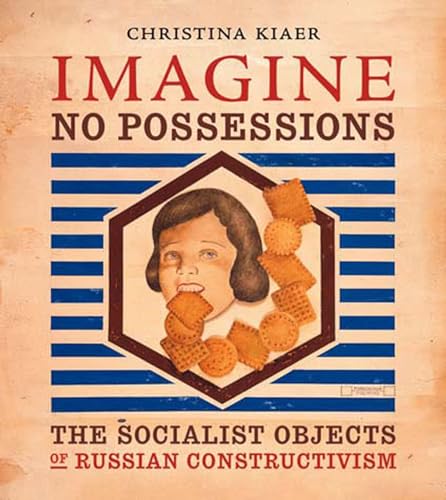Items related to Imagine No Possessions: The Socialist Objects of Russian...

Synopsis
How Constructivist artists in Russia between 1923 and 1925 developed a counterproposal to capitalism's commodity fetish by producing objects meant to be "comrades" in the creation of an egalitarian socialist culture.
In Imagine No Possessions, Christina Kiaer investigates the Russian Constructivist conception of objects as being more than commodities. "Our things in our hands must be equals, comrades," wrote Aleksandr Rodchenko in 1925. Kiaer analyzes this Constructivist counterproposal to capitalism's commodity fetish by examining objects produced by Constructivist artists between 1923 and 1925: Vladimir Tatlin's prototype designs for pots and pans and other everyday objects, Liubov' Popova's and Varvara Stepanova's fashion designs and textiles, Rodchenko's packaging and advertisements for state-owned businesses (made in collaboration with revolutionary poet Vladimir Mayakovsky), and Rodchenko's famous design for the interior of a workers' club. These artists, heeding the call of Constructivist manifestos to abandon the nonobjective painting and sculpture of the early Russian avant-garde and enter into Soviet industrial production, aimed to work as "artist-engineers" to produce useful objects for everyday life in the new socialist collective.
Kiaer shows how these artists elaborated on the theory of the socialist object-as-comrade in the practice of their art. They broke with the traditional model of the autonomous avant-garde, Kiaer argues, in order to participate more fully in the political project of the Soviet state. She analyzes Constructivism's attempt to develop modernist forms to forge a new comradely relationship between human subjects and the mass-produced objects of modernity; Constructivists could "imagine no possessions" (as John Lennon's song puts it) not by eliminating material objects but by eliminating the possessive relation to them. Considering such Constructivist objects as flapper dresses and cookie advertisements, Kiaer creates a dialogue between the more famous avant-garde works of these artists and their quirkier, less appreciated utilitarian objects. Working in the still semicapitalist Russia of the New Economic Policy, these artists were imagining, by creating their comradely objects, a socialist culture that had not yet arrived.
"synopsis" may belong to another edition of this title.
About the Author
Christina Kiaer is Associate Professor and Director of Undergraduate Studies in the Department of Art History and Archaeology at Columbia University.
Review
...a book so luminously written and gorgeously illustrated that Sovietologists, art historians, and students of modern culture of all stripes will find it a treat to open and impossible to put down.
―AAASS Vucinich prize committeeKiaer has written perhaps the most through study of this brief but highly provocative and original era...Imagine No Possessions is a valuable consideration of a period that, some seventy years after its end, continues to generate fertile discussion.
―Times Literary SupplementSplendid...Kiaer's very rich study...succeeds in convincing us that what had thus far been considered a fairly limited and even aberrant aspect of Constructivism was part and parcel of its ideological program.
―Artforum"About this title" may belong to another edition of this title.
- PublisherThe MIT Press
- Publication date2008
- ISBN 10 0262612216
- ISBN 13 9780262612210
- BindingPaperback
- LanguageEnglish
- Number of pages344
- Rating
Shipping:
FREE
Within U.S.A.
Search results for Imagine No Possessions: The Socialist Objects of Russian...
Imagine No Possessions: The Socialist Objects of Russian Constructivism (Mit Press)
Seller: ZBK Books, Carlstadt, NJ, U.S.A.
Condition: good. Used book in good and clean conditions. Pages and cover are intact. Limited notes marks and highlighting may be present. May show signs of normal shelf wear and bends on edges. Item may be missing CDs or access codes. May include library marks. Fast Shipping. Seller Inventory # ZWM.NHYQ
Quantity: 1 available
Imagine No Possessions: The Socialist Objects of Russian Constructivism (The MIT Press)
Seller: HPB-Red, Dallas, TX, U.S.A.
paperback. Condition: Acceptable. Connecting readers with great books since 1972. Used textbooks may not include companion materials such as access codes, etc. May have condition issues including wear and notes/highlighting. We ship orders daily and Customer Service is our top priority! Seller Inventory # S_426822145
Quantity: 1 available
Imagine No Possessions: The Socialist Objects of Russian Constructivism (Mit Press)
Seller: Pulpfiction Books, Vancouver, BC, Canada
Soft cover. Condition: Very Good. Very Good+ lightly rubbed and shelfworn trade paperback. Traces of carefully erased pencil marking throughout maybe a third of the text. A clean, cosmetically worn copy. Seller Inventory # 014299
Quantity: 1 available
Imagine No Possessions : The Socialist Objects of Russian Constructivism
Seller: Better World Books, Mishawaka, IN, U.S.A.
Condition: Very Good. Used book that is in excellent condition. May show signs of wear or have minor defects. Seller Inventory # 6110756-6
Quantity: 1 available

